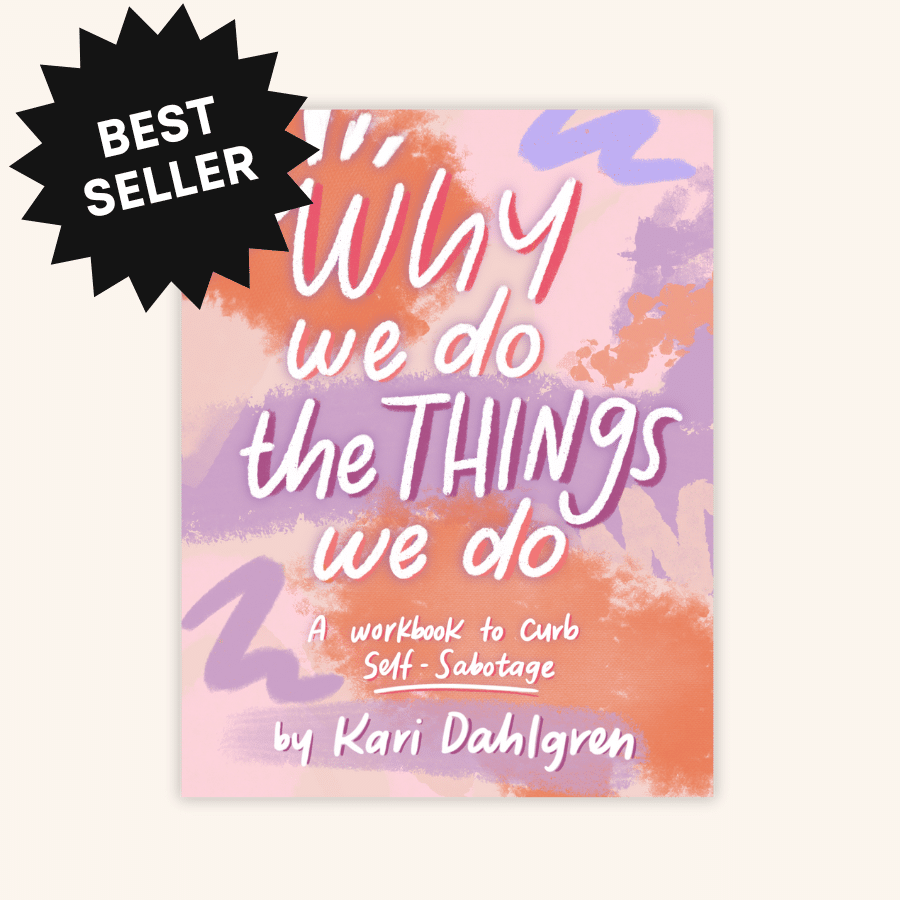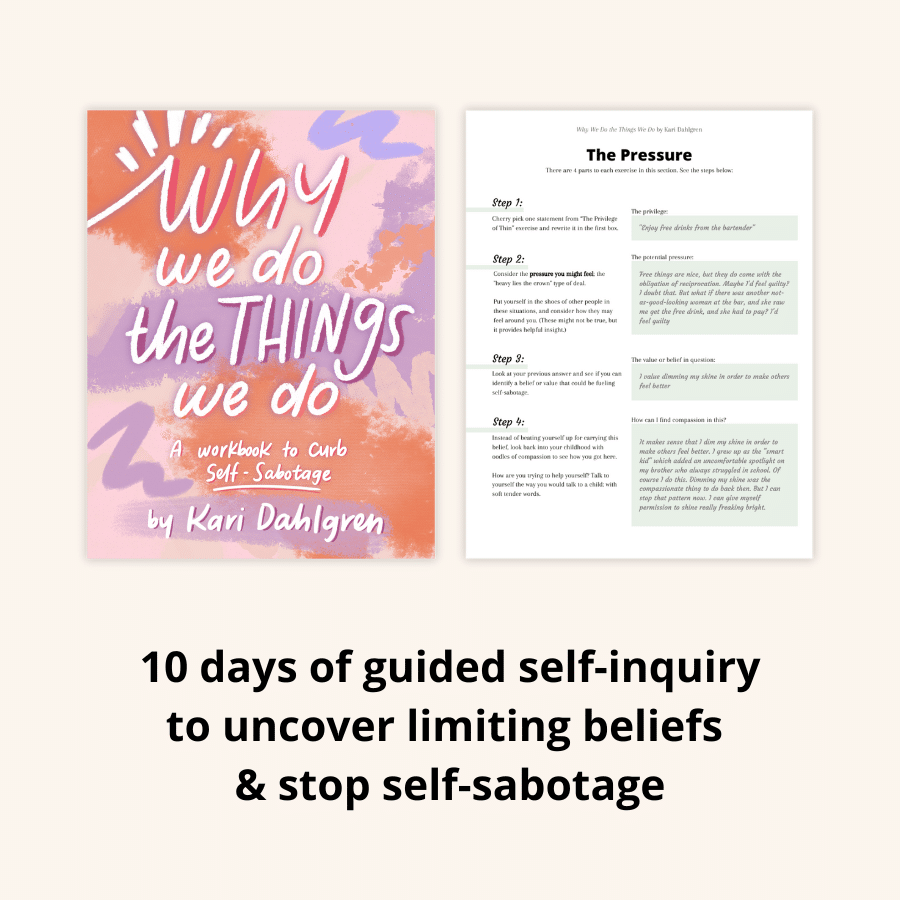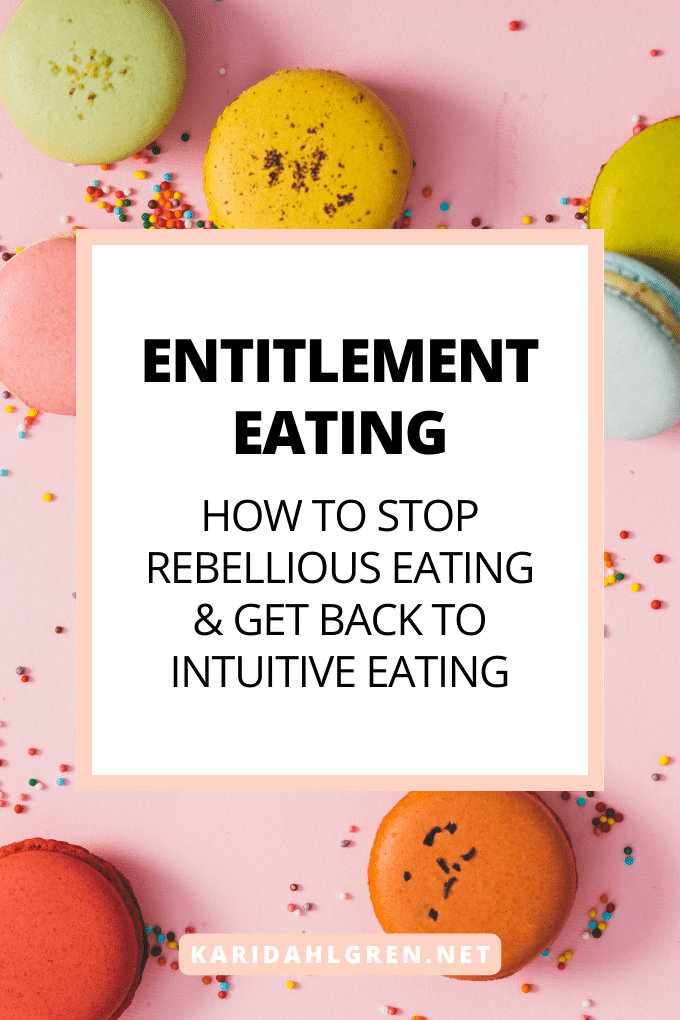
When I gave up dieting back in 2016, I distinctly remember feeling strangely obligated to eat unhealthy foods. In hindsight, I was struggling with entitlement eating.
Instead of eating dessert because it’s what I genuinely wanted, I felt obligated to eat dessert because it’s what you’re supposed to do, right? While I didn’t know it at the time, entitlement eating is a well-meaning but misguided attempt to eat intuitively. It’s actually our intellect masquerading as intuition.
You’re about to learn what entitlement eating is, how to identify the signs, and the steps you can take to address this type of emotional eating. I also cover entitlement eating in-depth in my online course, Food Normal.
What Is Entitlement Eating?
We all understand that eating healthily is beneficial and a touch of indulgence is often what our bodies genuinely crave. But what if, after choosing to give up dieting and eat intuitively, you begin to feel compelled to indulge in once-forbidden foods that you don’t actually want?
This is exactly how I felt when I gave up dieting back in 2016. Unbeknownst to me then, I was entering the “Rebellion Binge” stage post-dieting. I felt like I “should” be indulging in the foods that were once off-limited (also known as “forbidden foods”).
However, such obligations around food choices don’t lead us towards a harmonious relationship with food – which is the very essence of Psycho-Spiritual Wellness, my personal approach to stopping compulsive eating.
Furthermore, societal norms have linked certain foods to celebrations or emotional events. This cultural conditioning often influences our perceptions, leading to thoughts like “cake is for celebrations” or “ice cream is for heartbreak.”
These connections can further trigger entitlement eating, making it challenging to discern between genuine cravings and culturally induced desires.
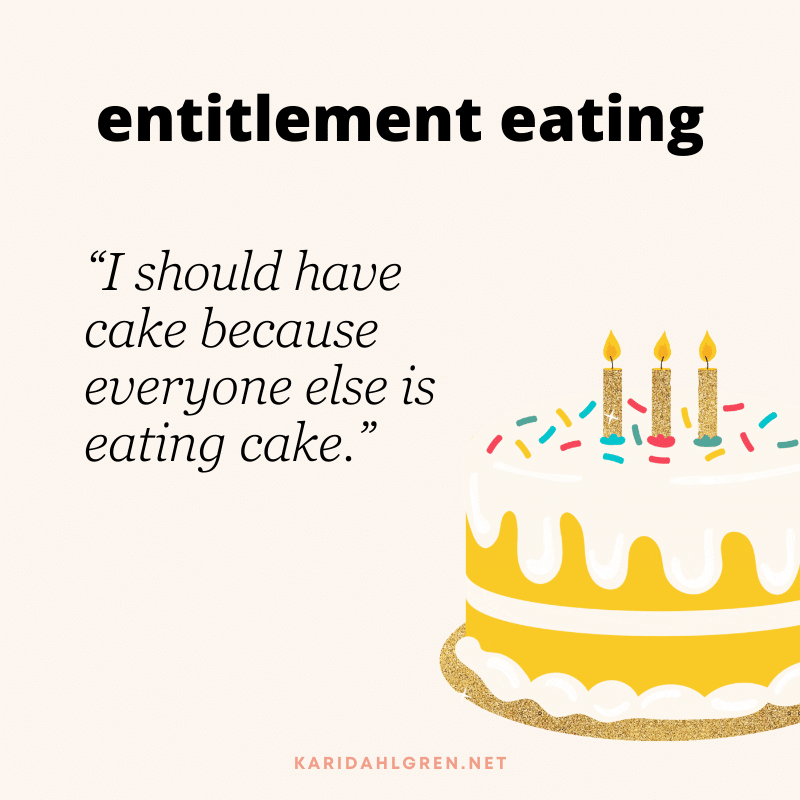
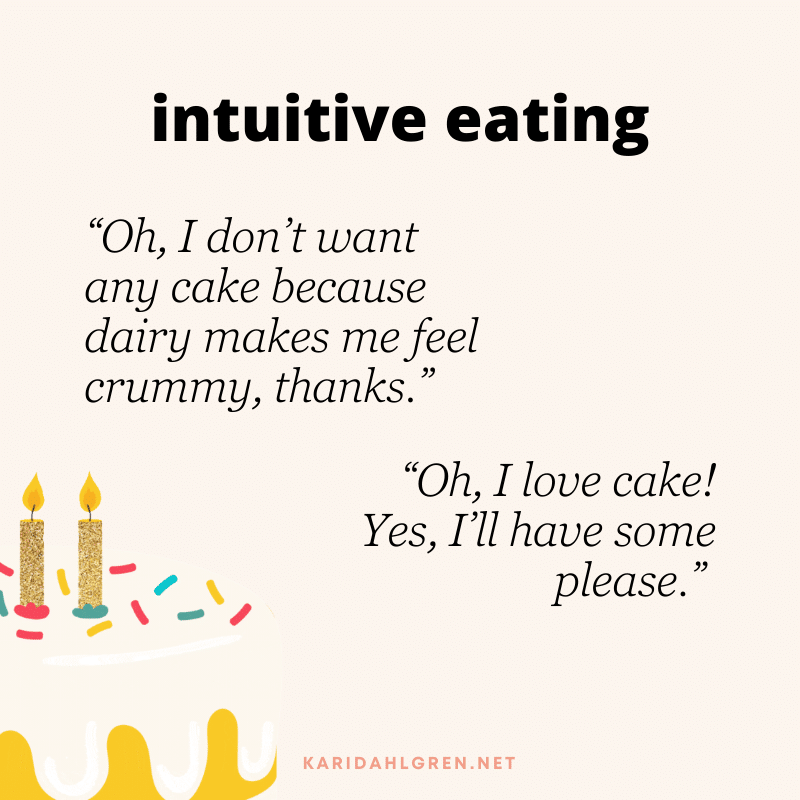
When you feel you “should” eat a certain way, it’s predominantly an intellectual decision. While our brain is magnificent for numerous tasks, it can often retain diet-mentality thought patterns even after we choose to give up dieting. New habits take time to form.
When you choose to give up dieting and listen to your body to inform what and when you eat, you’ll find it doesn’t rationalize choices like, “A salad would balance that burger,” or, “I should have dessert now that I’ve stopped dieting.” Instead, your dietary choices will feel intuitive like, “A salad seems right now,” or, “I want dessert tonight because it feels right.”
How Entitlement Eating Fits into the Stages of Giving Up Dieting
Upon giving up dieting, once-forbidden foods are no longer off-limits. Granting yourself this permission is fundamental to breaking free from the restrict-binge cycle. Suddenly, the chocolate cake that was once taboo becomes accessible, and this can trigger entitlement eating—an inconspicuous distraction from intuitive eating.
When you initially give up dieting, it’s natural to want to rebel against years of dietary suppression by indulging in the foods that weren’t previously allowed. Common examples include sugar, carbs, and “junk food.” The main challenge and work of learning to give up dieting is to honor physical hunger while addressing emotional hunger with more appropriate coping mechanisms.
In my work as an eating psychology coach, I’ve found that entitlement eating generally happens alongside “rebellion eating,” which is the second stage of giving up dieting. Here is my YouTube video where I discuss all 5 stages of giving up dieting:
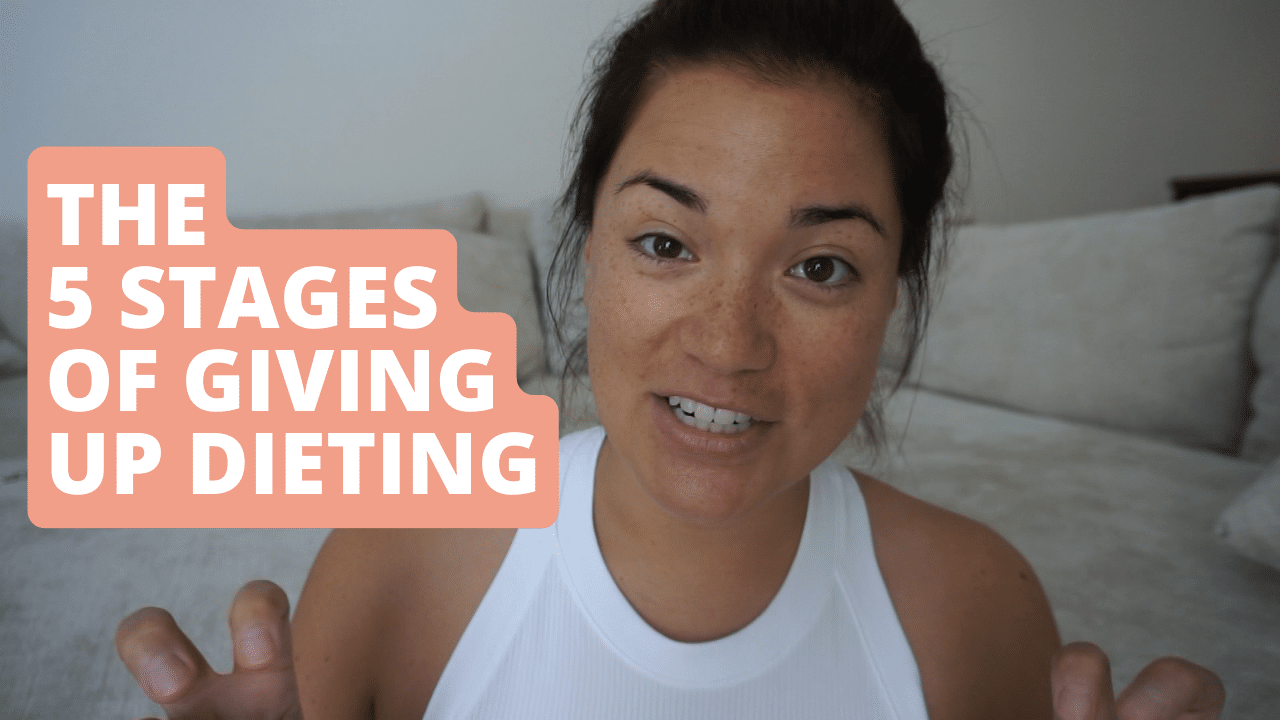
From my experience, the only way to pass through entitlement eating is to stay committed to giving up dieting and ride the stage out. This can trigger fears of weight gain in people who’ve recently given up dieting and still want to lose weight.
A potentially daily dilemma arises. If forbidden foods are allowed, won’t it lead to eating it all the time and, as a result, cause weight gain? After this anxiety comes another one: Now that forbidden foods are allowed, shouldn’t you eat them?
The answer is: eat them when you genuinely want them and you’re hungry. But if you don’t actually want the foods you feel obligated to eat (due to entitlement eating) don’t eat them.
The term “should” symbolizes intellectual eating, which quickly overshadows intuitive eating. Consume your once-forbidden foods if and only if you genuinely desire them – and you’re hungry for them. The assurance that these once-forbidden foods are always available can gradually transform them from being anxiety-inducing to just regular foods.
For instance, who’d have thought that Kashi cookies, which I was once obsessed with, would one day feel just ordinary? Who’d have guessed that after years and years of compulsively eating entire bags of sweets, I’d finally be able to have just one bite of a brownie and stop?
The freedom to eat your once-forbidden foods in sync with your true hunger and fullness – and in sync with your intuition and true desires, outside of obligation and entitlement eating – is what’s waiting for you after you make it through the stages of giving up dieting.
Signs of Entitlement Eating
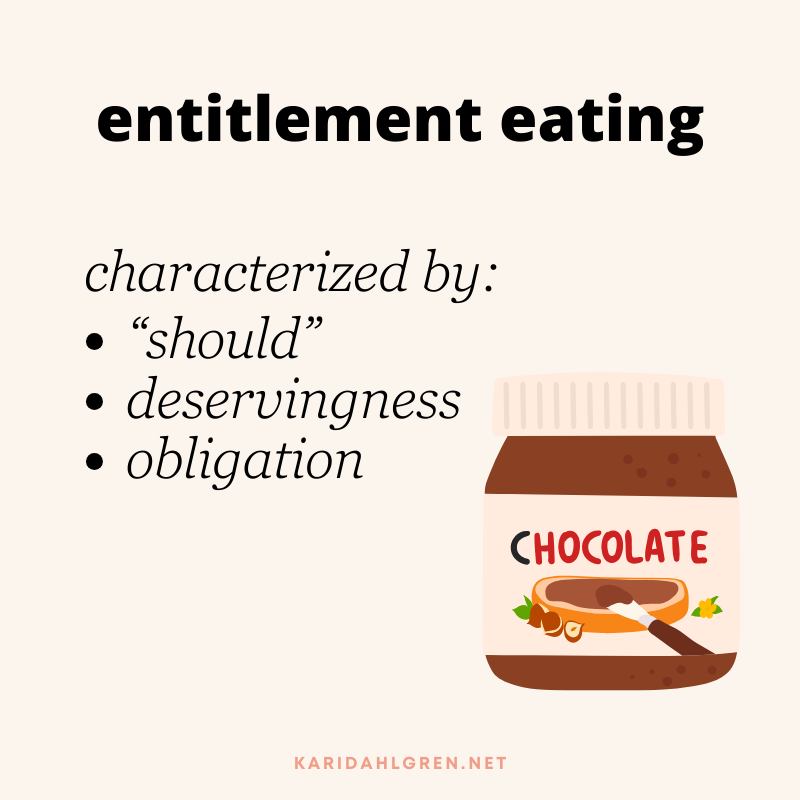
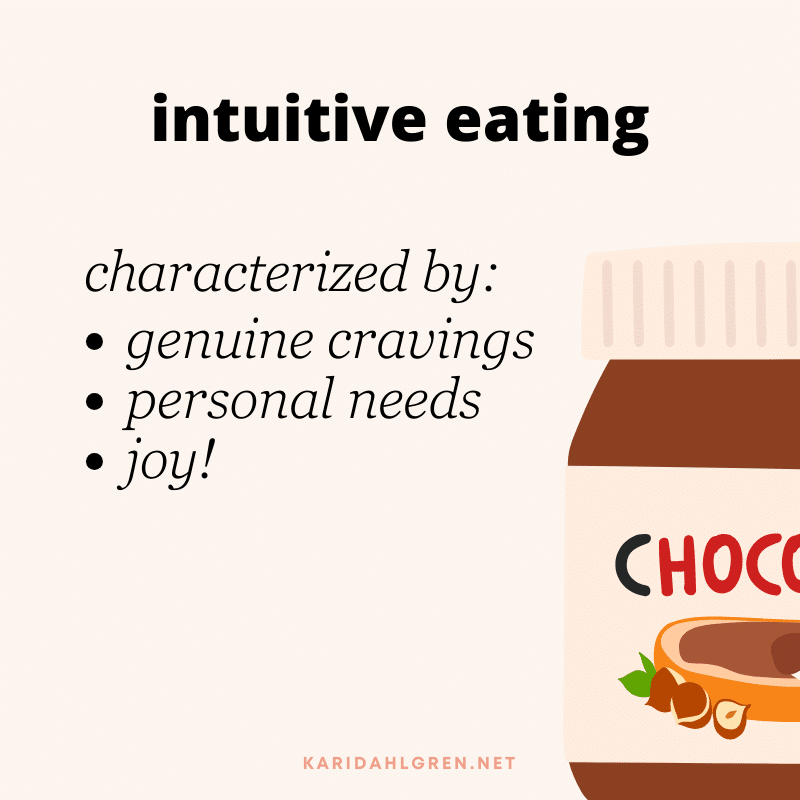
As we continue to navigate the intricate landscape of our relationship with food, it’s imperative to recognize the signs of entitlement eating and how they subtly, yet powerfully, influence our choices. Entitlement eating, in essence, stems from the pervasive grip of diet culture that has dominated our lives for decades.
Diet culture perpetuates the narrative that some foods are inherently “good” while others are “bad,” which is the opposite of food neutrality, and important concept in intuitive eating that views all foods as equal. When we rebel against diet culture, we sometimes feel a strange sense of entitlement to overindulge in the foods often labeled as “bad.”
As you begin to learn how to listen to your body to inform what you eat, it’s helpful to know what entitlement eating looks like. Here are some signs of entitlement eating:
- Obligation to Eat Once-Forbidden Foods: Intuitive eating is free from pressure to eat a certain way, including the pressure to eat once-forbidden foods. You’ll recognize entitlement eating if it feels like obligation.
- Persistent Thoughts of ‘Should’: A recurring theme in entitlement eating is the word “should.” You find yourself thinking you should eat that slice of cake because you’ve always been told not to. Use this word as a signpost: whenever you find yourself thinking in terms of should, take a moment to drop in and ask yourself if it’s a true craving or an obligation.
- Rationalizing or Over-Justifying Indulgences: Culture plays into entitlement eating when we use societal cues or personal achievements to validate our food choices. Signs of this pattern include thoughts such as, “I had a hard workout, I deserve a treat;” or, “They’re eating cake, so I should too.” Using food as a reward can overlap with entitlement eating, but not always.
- Disconnection from the Joy of Eating: Entitlement eating robs the joy out of the eating experience. Instead of savoring flavors and textures, the act becomes a hurried, almost ritualistic consumption, devoid of genuine pleasure.
If you find yourself eating the foods you enjoy without actually enjoying them, it could be entitlement eating or another type of emotional eating—all of which I cover in my online course, Food Normal.
Entitlement eating is a paradoxical trap. On the surface, it seems like a rejection of diet culture. However, it inadvertently keeps us ensnared, as our food choices are still reactive to it. The true liberation lies not in rebelling against the “shouldn’ts” but in authentically connecting with our intuitive cues. It’s about understanding the difference between eating a brownie because it’s a forbidden pleasure and eating it because it genuinely appeals to your senses and hunger at that moment.
How to Stop Entitlement Eating
Overcoming entitlement eating allows you to reconnect with your body’s genuine needs and desires. This fosters a more intuitive and authentic relationship with food, where choices are based on actual hunger and nutritional needs rather than societal pressures or emotional triggers.
Here are some steps you can take to address entitlement eating:
Check in with Hunger and Satisfaction
Understanding the difference between physical hunger and emotional hunger is foundational in curbing entitlement eating. Real hunger emerges gradually, starting with a subtle hint and increasing as time passes. Emotional hunger, on the other hand, appears suddenly, demanding immediate satiation.
Here’s my video where I explain this phenomenon—it’s pillar #4 of Psycho-Spiritual Wellness:
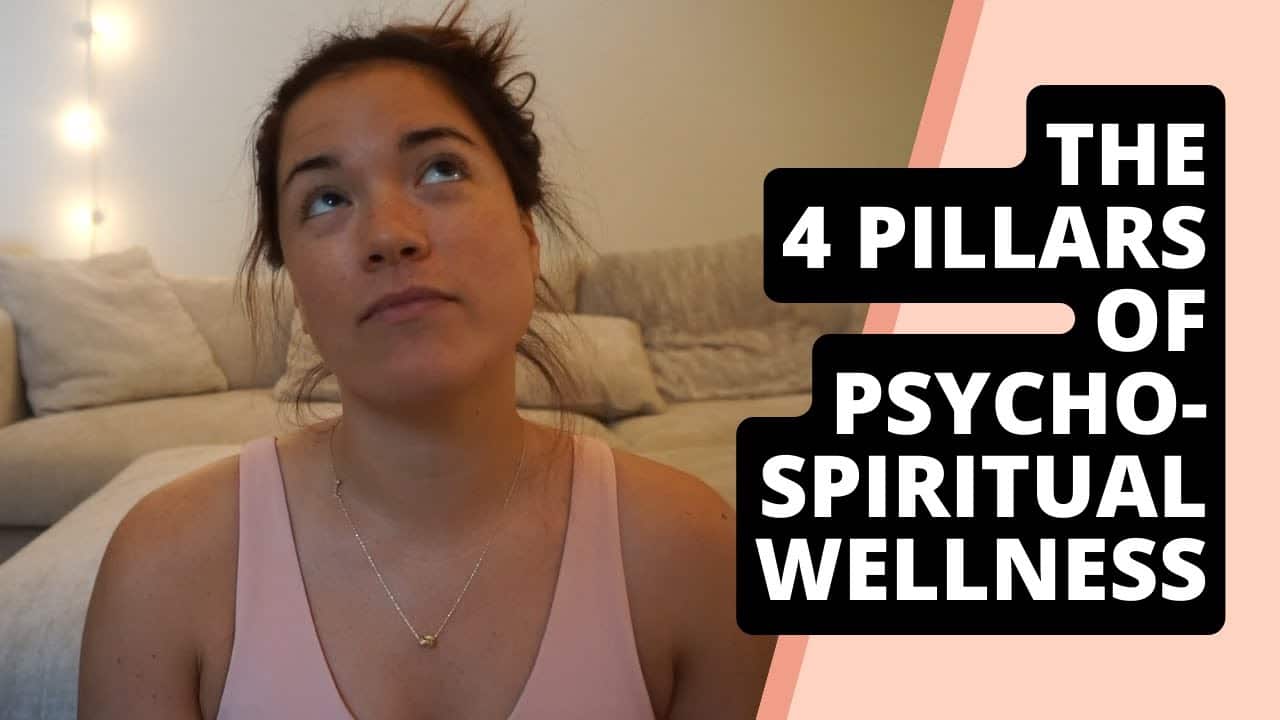
For instance, after an emotionally taxing day at work, you might find yourself gravitating towards comfort food. Ask yourself if it’s true physical hunger or just an obligation to eat the foods you once couldn’t when you were dieting (entitlement eating).
Also, I strongly recommend keeping your mind open to the possibility of physical hunger. In my experience, people with histories of chronic dieting forget what normal eating is; then they undereat and assume their late-night cravings are emotional when it’s actually physical hunger. Consider all possibilities and choose self-kindness wherever possible.
Evaluate if the Food Aligns with Personal Needs and Well-Being
The foods we consume directly impact our mood, energy levels, and overall health. Suppose you’re an athlete or someone with a physically demanding job. In that case, your dietary requirements differ from someone with a slower lifestyle.
For instance, if you’re a working single-parent, a carb-heavy meal might be just what you need to start your day. Normal eating could involve eating a carb-rich breakfast because you’re craving it, and it intuitively feels good for your body and your personal needs.
Entitlement eating happens when you feel pressured to eat a carb-rich meal like pancakes, which once were off-limits, because you ‘should’ eat them now, even though you’re actually craving a fruit smoothie for breakfast.
Recognize Multiple Desires and Weighing Them
Another step that helps with entitlement eating is recognizing the duality of our choices. It’s common to feel torn between the immediate pleasure of indulgence and the long-term benefits of a healthier choice. Imagine you’re at a party, and there’s a lavish spread of desserts. The chocolate cake looks enticing, but you also remember how sluggish sugary foods make you feel.
At the same time, the fresh fruit platter is equally appealing and aligns with your personal needs. Recognizing these conflicting desires—the obligation to eat once-forbidden foods like cake versus the ‘healthier’ option that equally appeals to you—allows for a more informed choice.
For example, I am a person who doesn’t tolerate dairy very well and because of this, I love hunting for dairy-free dessert alternatives. When I was living with a former roommate (who was an anti-diet dietitian) she called me out one day when she saw me reaching for vegan ice cream.
She said, “If you stopped dieting, shouldn’t you just have the regular ice cream?” In her eyes, she thought I was restricting myself in order to be “healthy,” but the reality is that I was making a decision rooted in my desire to honor my cravings while choosing foods that make me feel good. I love vegan ice cream and choosing it over regular ice cream did not make me feel deprived – a hallmark sign that you’re not restricting yourself.
Choose Wellness Over Weight Loss
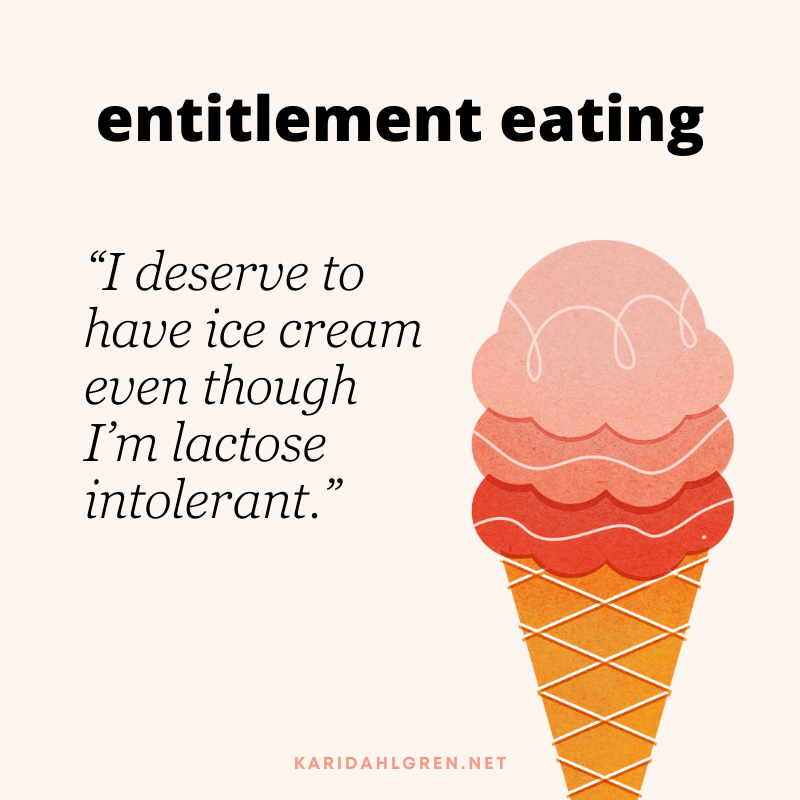
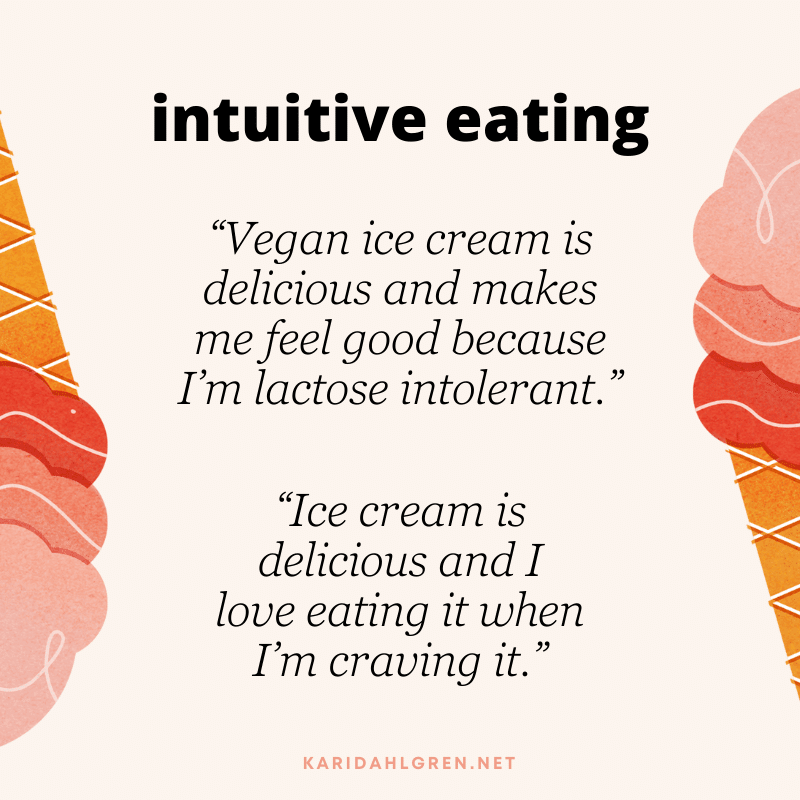
Entitlement eating can feel murky and confusing when you have medically necessary dietary restrictions and you struggle with feeling obligated to eat all foods when you give up dieting. When you have health conditions that place certain foods off-limits, it’s okay and also necessary to act within those boundaries for the sake of your health and wellbeing.
Some people grow afraid that these dietary restrictions will trigger diet mentality and ruin their chances of making it through the stages of giving up dieting. When this fear crops up, stay focused on wellness over weight loss and you’ll remain clear of the restrict-binge cycle.
As I’ve written about on my blog before, when we choose wellness over weight loss, we can honor dietary restrictions while remaining committed to giving up dieting. For example, if you’re like me and don’t tolerate dairy very well, you can choose a dairy-free meal over a dairy-full meal without triggering feelings of restriction.
However, if you choose a dairy-free meal because you think it will help with weight loss, and you don’t actually want the dairy-free option, then this will trigger feelings of restriction. In turn, this can trigger the restrict-binge cycle and keep you stuck in rebellion eating and entitlement eating.
Stay committed to allowing all foods while also honoring your body and its needs. Distinguish between the desire to nourish your body and the desire to lose weight. Continue to choose the path of wellness over weight loss and you’ll remain free of the restrict-binge cycle (which will help you reach your natural weight in the long-run anyways).
Navigating Obligations, Entitlement, and Eating
Entitlement eating is a nuanced facet of our journey towards intuitive eating, rooted in past restrictions and societal pressures. It’s essential to recognize its subtle influence and differentiate between genuine cravings and obligations stemming from diet culture.
Continue to check in with your true desires and hunger cues, evaluate food choices based on genuine well-being, and prioritizing wellness over weight loss. This will pave the way out of entitlement eating and into a relaxed space where you feel normal around food—and that’s the ultimate goal.


